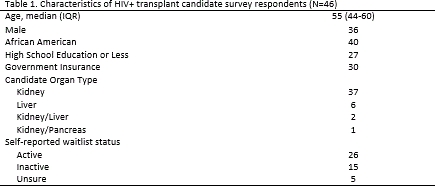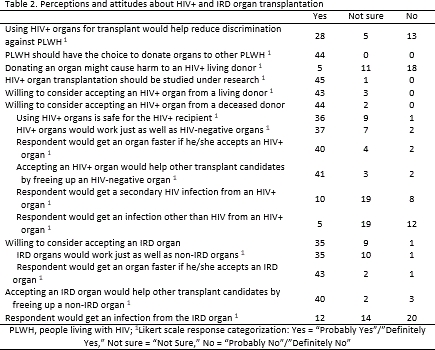Willingness to Accept HIV-Positive and Increased Infectious Risk Donor Organs among HIV-Positive Transplant Candidates
JHU, Baltimore.
Meeting: 2018 American Transplant Congress
Abstract number: B306
Keywords: HIV virus, Kidney/liver transplantation
Session Information
Session Name: Poster Session B: Non-Organ Specific: Economics, Public Policy, Allocation, Ethics
Session Type: Poster Session
Date: Sunday, June 3, 2018
Session Time: 6:00pm-7:00pm
 Presentation Time: 6:00pm-7:00pm
Presentation Time: 6:00pm-7:00pm
Location: Hall 4EF
Implementation of HIV+ to HIV+ organ transplantation under the HOPE Act could shorten waitlist times for HIV+ transplant candidates. However, realizing these potential benefits depends on whether HIV+ candidates are willing to accept these organs.
Methods: We conducted a single-center survey of willingness to accept HIV+ and increased infectious risk donor (IRD) organs among HIV+ kidney and liver transplant candidates. Attitudes and perceptions were assessed through yes/no and Likert scale questions.
Results: Of 66 individuals contacted, 46 responded. The median age was 55; 36 were male; 40 were African American; and 30 had government insurance (Table 1). There was broad willingness to accept HIV+ donor organs: 43 were willing to accept an HIV+ living donor organ and 44 were willing to accept an HIV+ deceased donor organ. Interestingly, only 35 were willing to accept an IRD organ. Most respondents believed that HIV+ and IRD organs would work as well as standard criteria organs and would allow them to get an organ faster (Table 2). However, 14 and 19 respondents were unsure about risk of infection from IRD and HIV+ organs, respectively, and 19 were unsure about the risk of secondary HIV infection (Table 2).
Conclusion: The vast majority of HIV+ transplant candidates at our center were willing to accept HIV+ donor organs. In fact, we found that candidates were more willing to accept HIV+ donor organs than IRD organs. Overall HIV+ transplant candidates felt HIV+ donor organs would function well though nearly half were uncertain about the risks of infection from HIV+ donor organs.
CITATION INFORMATION: Waldram M., Eno A., Lee E., Seaman S., Nguyen A., Halpern S., Anjum S., Sugarman J., Henderson M., Tobian A., Segev D., Durand C. Willingness to Accept HIV-Positive and Increased Infectious Risk Donor Organs among HIV-Positive Transplant Candidates Am J Transplant. 2017;17 (suppl 3).
To cite this abstract in AMA style:
Waldram M, Eno A, Lee E, Seaman S, Nguyen A, Halpern S, Anjum S, Sugarman J, Henderson M, Tobian A, Segev D, Durand C. Willingness to Accept HIV-Positive and Increased Infectious Risk Donor Organs among HIV-Positive Transplant Candidates [abstract]. https://atcmeetingabstracts.com/abstract/willingness-to-accept-hiv-positive-and-increased-infectious-risk-donor-organs-among-hiv-positive-transplant-candidates/. Accessed February 17, 2026.« Back to 2018 American Transplant Congress


